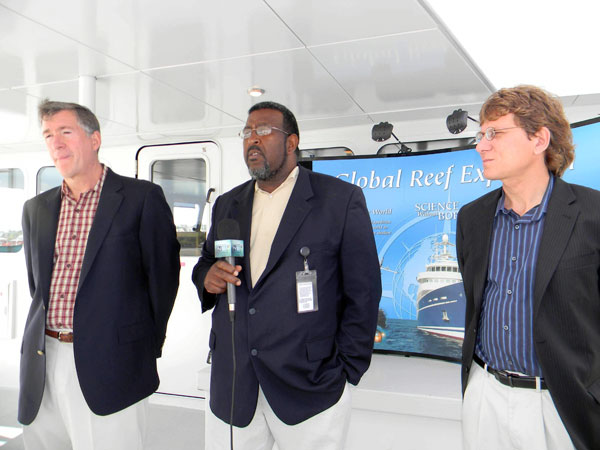
Eric Carey stands in a press conference with expedition partners from the Khaled bin Sultan Living Oceans Foundation, which will be in The Bahamas for the next year mapping out the Coral Reef network. Pictured from left to right are Capt. Phillip Renault, Living Oceans executive director; Eric Carey, BNT executive director, and Dr. Andy Bruckner, Living Oceans Chief Scientist (BIS Photo / Gena Gibbs).
|
Nassau, The Bahamas – Ocean pollution
is threatening to deplete the commercial fisheries stock in the coral
reefs of The Bahamas and other Small Island Developing States (SIDS)
around the world. The Living Oceans Foundation chose The Bahamas to
launch their research project that examines the coral reef systems of
25 island countries worldwide.
“We are extremely pleased and we feel
privileged that the Living Oceans Foundation has selected The Bahamas
as the country to start this five-year incredible exploration to determine
the state of the world’s coral reefs,” said Eric Carey, executive
director of the Bahamas National Trust.
“The Bahamas National Trust is working
with other agencies like the Nature Conservancy, Friends of the Environment,
the Andros Conservancy are really pleased to be partnering with the
Foundation and organisations like the Ministry of the Environment, the
department of Marine Resources to make this happen.”
On April 7, The Bahamas National Trust
and The Khaled bin Sultan Living Oceans Foundation held a press conference
for the “Science Without Borders” exercise on board the Motor
Yacht Golden Shadow at the Prince George Dock in historic downtown Nassau.
“This is an incredible opportunity
to be a part of. The world’s coral reefs are extremely important globally,
but nationally whether you’re talking from the perspective of people
diving and having an experience of contributing millions of dollars
to our economy, or a fisherman who benefits from the ecological benefits
that coral reefs provide, or people who benefit from the buffer from
storms that fringing reefs provide to our coast, Coral reefs are extremely
important to The Bahamas”, said Mr. Carey.
The scientific research group announced
its plans for the next five years to travel around the world to study
the damage of ocean pollution. The results are expected to reveal global
solutions that encourage responsibility to keep the oceans clean because
it is the source of the world’s food supply.
“It is extremely important obviously
to know what the conditions of our reefs are, to access what the real
vulnerability is to threats like climate change, and also to think about
adaptation measures The Bahamas might be able to participate in either
nationally, internationally, or globally, so that all needs to be underpinned
with sound science,” said Mr. Carey.
“So, we are pleased the Living Oceans
Foundation whose executive director, Capt. Phil Renaud is with us, has
decided to launch this global expedition and to start it right here
in The Bahamas.”
The contamination of coral reefs are
killing the living coral and endangering the various species of marine
animals that live and are protected there.
